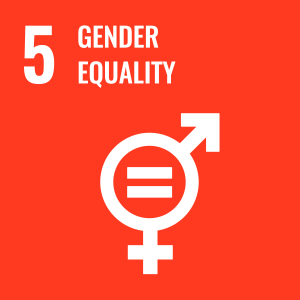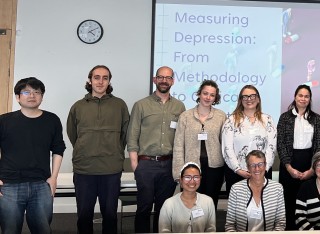
Dr Rose Rickford
About
Biography
Rose is a qualitative social scientist and health services researcher with particular methodological interest and experience in qualitative interviewing, conversation analysis, reflexive thematic analysis, and using comparative methods to develop explanatory theory. Her primary research interest is in how health and social care organisations can work better to meet diverse and changing needs.
Having completed her undergraduate degree in Sociology in 2007, Rose worked in the voluntary and community sector for over a decade before returning to academia in 2018. She completed her PhD in 2023 at the Department of Sociology, University of York, in which she investigated the response of grassroots community organisations to the crisis of the Covid-19 pandemic in England and Wales, and developed explanatory theory about the relationship between organisational structures and processes and organisational ability to respond effectively to diverse and changing needs.
Alongside her PhD, Rose worked as a Research Assistant at the University of Huddersfield in the Department of Nursing and Midwifery and the Department of Psychology, working on mixed-methods studies relating to secondary mental health care and primary HPV/cervical screening respectively. After completing her PhD she spent a year as a postdoctoral researcher in the Faculty of History, University of Oxford, where she collected and analysed oral histories from women involved in learning and teaching manual trades in grassroots feminist skills sharing projects in 1970s-1990s Britain.
She is currently a Research Fellow in Qualitative Methods on the PAPER study, investigating ethnic inequalities in primary mental health care.
My qualifications
Previous roles
Graduate Teaching Assistant, Language and Linguistic Science
Affiliations and memberships
ResearchResearch interests
Rose is interested in the everyday organisation of health and social care. Her overall focus is on how health and social care organisations, particularly primary care, social care, and voluntary and community organisations, can be organised to maximise their ability to support people's wellbeing and tackle inequalities.
Her current areas of focus are the organisation of the diagnosis and treatment of depression in primary care and the organisation of cervical screening in primary care.
Rose is also interested in relationships between research methodology and ontology/metaphysics, and broadly in conducting research that addresses the specific interests and needs of women and racialised groups.
Research projects
We know that there are differences between ethnic groups in the amounts and types of medications prescribed. We are interested in understanding the prescribing of antidepressant medication, particularly focussing on the experiences of patients from a South Asian minority ethnic background, who are living in the UK.
Research interests
Rose is interested in the everyday organisation of health and social care. Her overall focus is on how health and social care organisations, particularly primary care, social care, and voluntary and community organisations, can be organised to maximise their ability to support people's wellbeing and tackle inequalities.
Her current areas of focus are the organisation of the diagnosis and treatment of depression in primary care and the organisation of cervical screening in primary care.
Rose is also interested in relationships between research methodology and ontology/metaphysics, and broadly in conducting research that addresses the specific interests and needs of women and racialised groups.
Research projects
We know that there are differences between ethnic groups in the amounts and types of medications prescribed. We are interested in understanding the prescribing of antidepressant medication, particularly focussing on the experiences of patients from a South Asian minority ethnic background, who are living in the UK.
Teaching
At the University of Surrey, Rose teaches Research Ethics for PsychD trainees. She also supervises Psychology MSc dissertation projects and PsychD Major Research Projects.
Rose is also an Occasional Lecturer at the University of the West of England (UWE), where she teaches methodology and social theory to midwifery trainees.
Sustainable development goals
My research interests are related to the following:



Publications
Cervical screening rates in the UK are declining. While previous research has identified barriers to screening uptake, less is known about why many women attend cervical screening despite these barriers. This qualitative study explores factors influencing cervical screening decision-making. Through reflexive thematic analysis of semi-structured interviews ( = 44), two overall themes were developed: Perceived purpose of Screening and Experience of Screening. The analysis indicates that beliefs are central to decision-making and relate to individual meaning-making in relation to knowledge and information. The same information may be interpreted differently by different women and therefore impact cervical screening decision-making in different ways. Women associate cervical screening with pain, embarrassment and potential violation, but many choose to attend despite this. Trust, person-centred care and continuity of care are important for mitigating these negative perceptions and experiences. Implications of findings are discussed and include moving beyond knowledge-based public health interventions for enhancing cervical screening uptake.
South Asians are the largest ethnic minority in the UK, reflecting a migratory flow which began in earnest following the Partition of India in 1947 to fill a labour shortage in post-war Britain. Indian, Pakistani and Bangladeshi communities today represent 3.1, 2.7, and 1.1% of the British population, respectively. A further 1.6% of the population belong to other Asian heritages, capturing Sri Lankan and Nepali ethnicities, among others. The grouping of ‘South Asians’ privileges geographical commonality and conceals a myriad of individual identities incorporating language, gender, religion, caste and culture. As such, the term South Asian reflects an essentialist stance, which homogenises ethnicity and in so doing risks overlooking important social differences. This is particularly true when considering British South Asians, in which differences by migration, generation, location, financial deprivation, and perceived discrimination interweave to influence national identity and acculturation. Taking a granular lens to ethnicity can help inform our understanding of mental health outcomes. While an increased risk of serious mental illness has been shown for South Asians in the UK relative to White individuals, this broad-brush approach to defining ethnicity lacks nuance; for example, research has reported lower rates of psychosis among British Bangladeshi communities. Furthermore, among British South Asian populations differences in common mental disorders are documented, with older Indian and Pakistani women being particularly vulnerable relative to their White counterparts. Experiences of discrimination, behavioural and lifestyle factors, and broader beliefs about health and illness, are all likely to partly account for the differences observed between South Asian ethnic groups and their White counterparts. Variability in access and uptake of healthcare must also be recognised and may even impact the accuracy of existing prevalence estimates which often rely on first diagnosis data.
It has been widely reported that community organizations played a key role in meeting people’s basic needs, such as needs for food, medicines, and social contact, during COVID-19 lockdowns around the world. This article explores the perspectives of organizers and workers from 25 community organizations in England, regarding their organizations' responses to the crisis of the Covid-19 pandemic. Thematic analysis and comparison of cases is used to theorize why many community organizations were so effective at meeting needs in their communities during the early months of the pandemic. It is argued that key features of effective responses were Identifying need through trust-based relationships; Acting teleologically to meet need; and Valuing the knowledge of community-facing workers. These factors interacted with one another in a relational response process of need-meeting. I argue that effective responses to local need involves an asset-based approach to organizational structures, in which everyone working in a community organization, on a paid or unpaid basis, has their expertise valued as part of organizational decision-making.
South Asian people represent the largest minority ethnic group in the UK, but prior research has suggested unequal access to primary care and differences in antidepressant prescribing practices for these patients. To understand the treatment of depression in South Asian patients, with specific reference to factors affecting appropriate prescribing. The secondary aim is to understand the intersection between ethnicity, age, and financial deprivation within this context. A mixed-methods approach will be adopted, including primary and secondary analyses, to understand the ways in which inequalities may arise along the pathway from patient experience of symptoms to clinician decision to treat with antidepressants in UK primary care. Two scoping reviews will inform our approach. Quantitative data analysis of UK Biobank will allow us to examine prevalence and heterogeneity in depressive symptoms, and antidepressant prescribing over time, stratified by ethnicity. Qualitative data will be generated through interviews and focus group discussions with patients and healthcare professionals to understand experiences of depression and document the depression management decision-making process. The PAPER study will produce clinically relevant findings to support the treatment and management of depression in primary care for South Asian patients. The dissemination plan will be informed by patient and public involvement (PPI) group members and engagement with stakeholders. Our main outputs will include a toolkit of resources for use in primary care as well as community-facing materials.
Interviews with women involved in learning and teaching non-traditional skills in Britain, 1970s-1990s.
Research into the experiences of trans and non-binary users of maternity services in England was recently commissioned by the Health and Wellbeing Alliance. It was conducted by the LGBT Foundation, culminating in the ‘improving trans and non-binary experiences of maternity services’ report, which made a range of recommendations for the NHS. This article argues that there are substantial problems with the framing, data collection and interpretation of data in the report, and that its findings and recommendations should therefore be viewed with substantial caution, and not be used as the basis of NHS policy. The authors further argue that caution should be taken before using the experiences of a very small minority of service users, such as those who identify as trans and non-binary, to inform policy for all service users, and instead suggest that personalised care may be the most suitable approach to meeting the specific needs of trans and non-binary maternity service users.
Addressing spirituality is part of holistic care. Spirituality is hard to define and may be confused with religion. Thus, it may be neglected by practitioners in mental healthcare. This study explores the views of mental health practitioners about approaches to spirituality in their practice and the perceived utility of the concepts of 'Spiritually Competent Practice' and 'Availability and Vulnerability' for integrating spirituality into practice. It confirms the need for more education in this area and suggests ways to include spirituality in Mental Health Care. Survey responses were gathered from 104 clinical staff within a mental health trust (8% response rate) in 2018. Thirteen participants were also interviewed. Data were analysed thematically using template analysis with NVivo software. Participants identified that they wanted to integrate spirituality into practice and found the concepts of Spiritually Competent Practice and Availability and Vulnerability useful. Spiritually Competent Practice enabled practitioners to be clearer about addressing spirituality in practice; embracing Availability and Vulnerability enabled truly holistic care to be offered. These concepts provided ways of understanding the conditions and personal qualities helpful in providing spiritual care to mental health service users. Implications for practice are that Spiritually Competent Practice and Availability and Vulnerability may be helpful concepts in integrating spirituality into practice in mental healthcare.
This article uses conversation analysis (CA) on a single case study (a call to a helpline for women with symphysis pubis dysfunction) to explore how, and why, a speaker produces a non-present third person she has earlier referred to using a non-gendered term (`your partner') as a member of a gendered category (`a bloke') — and why she later seeks to undo this categorization. This contributes to (feminist) CA an understanding of how gender is constructed in talk-in-interaction and, more generally, to understandings of membership categorization and person reference.
ObjectiveCervical cancer remains a significant health threat amongst women globally despite most cervical cancers being preventable through screening and Human Papilloma Virus (HPV) vaccination. With the introduction of HPV testing and vaccination, evidence suggests that the frequency of cervical screening for women can be reduced. However, there is limited evidence on women's attitudes to possible changes to the cervical screening programme. This study explored attitudes, perceptions and beliefs of women in the United Kingdom (UK) regarding potential changes to the National Cervical Screening Programme. MethodForty-four women were interviewed between November 2018 and March 2019. Reflexive thematic analysis was used to identify key themes. ResultsMost participants were opposed to any reduction in cervical screening frequency. Reasons included perceptions that disease would develop undetected, disempowerment, increased anxiety, reduced motivation to attend, and inefficient use of health care resources. Women perceived that they were ill-informed about the reasons for the proposed change, and that access to evidence for the basis of proposed changes may persuade them to accept reduced screening frequency. Women believed that cervical screening is a test for cancer and that HPV vaccination does not provide reliable protection against cervical cancer. These beliefs suggest that women's perception that they require more information about the basis for reduced screening frequency is correct. ConclusionAny changes to cervical screening frequency need to ensure public support and trust through a robust public health initiative clearly identifying the rationale for any changes.
Objective Evidence suggests that cervical screening intervals can be extended and lifetime cervical screening for human papillomavirus (HPV)-vaccinated women could be reduced. This study examines UK women's attitudes to extending screening intervals and assesses associations between knowledge, risk perception and HPV vaccination status, and acceptability of changes. Methods Using a convenience sampling strategy, an anonymous mixed-methods online survey was used and data recorded from 647 women (mean age = 28.63, SD = 8.69). Results Across the full sample, 46.1% of women indicated they would wait 5 years for their next cervical screening, while 60.2% of HPV-vaccinated women would be unwilling to have as few as three cervical screens in a lifetime. Multivariate analysis revealed those who are regular screened, those who intend to attend when invited, and those who perceive greater personal risk of cervical cancer are less likely to accept a 5-year screening interval. Qualitative findings relating to benefits of extending intervals included convenience of less tests, less physical discomfort, and psychological distress. Concerns identified included the likelihood of developing illness, increased psychological distress relating to what may be happening in the body, and worries about increased risk of cervical cancer. Conclusion Women need clear and specific information about HPV timelines, their relationship with cancer risk, and the rationale for extending screening intervals.

